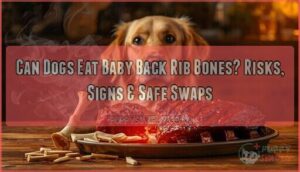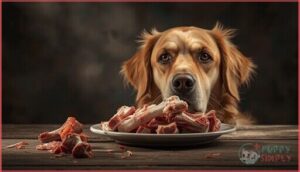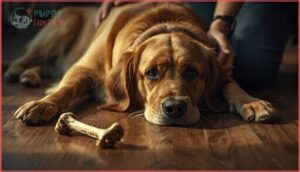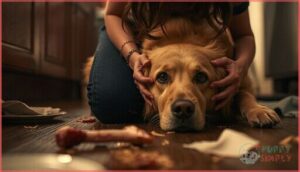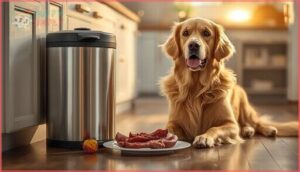This site is supported by our readers. We may earn a commission, at no cost to you, if you purchase through links.
That platter of baby back ribs smells amazing to your dog—and when a few bones hit the floor, it’s tempting to let them have at it. Dogs have chewed on bones for thousands of years, so what’s the harm?
Quite a bit, it turns out. Unlike raw bones, cooked rib bones splinter into sharp shards that can tear through soft tissue, block the digestive tract, or become a choking hazard in seconds. Knowing whether dogs can eat baby back rib bones—and what to do if yours already has—could genuinely save their life.
Table Of Contents
- Key Takeaways
- Can Dogs Eat Baby Back Rib Bones?
- Risks of Feeding Dogs Baby Back Rib Bones
- Signs Your Dog Has Eaten a Rib Bone
- What to Do if Your Dog Eats Rib Bones
- Safe Alternatives to Baby Back Rib Bones
- Frequently Asked Questions (FAQs)
- Which bones are safe for dogs to eat?
- What bones are safe for dogs to eat?
- Can a dog’s stomach dissolve a bone?
- What if my dog eats a cooked bone?
- Can dogs eat baby back rib bones?
- Can dogs eat pork ribs?
- Are rib bones safe for dogs?
- Can dogs eat short rib bones?
- Can I Give My Dog Rib Bones?
- Can baby back rib bones be toxic to dogs?
- Conclusion
Key Takeaways
- Cooked baby back rib bones splinter into sharp shards that can tear soft tissue, block the digestive tract, or become a choking hazard — making them dangerous regardless of how natural they seem.
- Raw rib bones are not a safe alternative either, since pork bones can still splinter and may carry bacteria like Salmonella or parasites that pose risks to both your dog and your household.
- If your dog eats a rib bone, do not wait for symptoms — call your vet immediately, since internal damage can escalate within hours and early care makes a real difference.
- Vet-approved rubber chews and VOHC-certified dental chews satisfy your dog’s urge to chew without the risks that come with any kind of rib bone.
Can Dogs Eat Baby Back Rib Bones?
Baby back rib bones might seem like a natural treat, but the answer isn’t as simple as yes or no.
The risks depend on whether the bones are cooked or raw, so it’s worth checking what vets actually say about dogs and beef rib bones before you hand one over.
A few key factors determine whether they’re safe — or a serious risk — for your dog.
Here’s what you need to know before making that call.
Raw Vs. Cooked Rib Bones
Both raw and cooked rib bones carry real risks for your dog — preparation method doesn’t make them safe. Here’s what bone texture and cooking methods actually mean:
- Raw bones can still splinter, especially pork ribs
- Cooked rib bones become brittle, breaking into sharp shards
- Both create choking hazards regardless of raw feeding philosophy
Canine nutrition never justifies the risk.
Pet owners should also consider responsible bone handling practices to minimize the dangers these bones pose to dogs.
Common Reasons Owners Consider Rib Bones
Even knowing the risks, it’s easy to see why so many owners reach for rib bones. Natural Instincts drive dogs to chew, and watching your dog enjoy a leftover bone feels right.
Dental Assumptions, Taste Appeal, and Cost Savings all add up. Safety Myths — passed down from “my dog ate bones his whole life” — make baby back rib bones feel harmless when they aren’t.
However, dog owners should be aware of the real dangers such as potential internal damage risks before allowing their pets to have rib bones.
Veterinary Recommendations
Most veterinarians are clear on this: rib bones aren’t worth the risk. Veterinary recommendations consistently point owners toward safer paths — and the reasoning is solid.
- Veterinary guidance flags all rib bones, cooked or raw, as unsafe
- Bone alternatives like rubber chews better support dog safety
- Veterinary advice discourages table scraps for pet nutrition
- Safe chews approved by vets protect dog nutrition and health
Risks of Feeding Dogs Baby Back Rib Bones
Rib bones might seem like a natural treat, but they come with some real dangers that are worth understanding before you toss one to your dog.
The risks aren’t just about choking — they go deeper than most people realize. Here’s what you need to know.
Choking Hazards and Splintering
Cooked baby back rib bones are a serious choking hazard — and bone fragmentation is the reason why. Cooking dries out the structure, making splintering risks much higher than with raw bones.
Those sharp shards can cause airway obstruction or esophageal damage before you even realize something’s wrong. For choking prevention, bone safety starts with understanding that no cooked rib bone is ever truly safe to chew.
Digestive Tract Injuries
Once a bone fragment travels past the throat, the real danger begins. Sharp splinters can cause gut perforation, intestinal blockage, colonic damage, and even rectal injury as they move through. Pancreatitis risk rises sharply too, especially after fatty rib meals.
Once a rib bone fragment passes the throat, it can perforate the gut, block the intestines, and trigger pancreatitis
Watch for these gastrointestinal complications:
- Repeated vomiting or loss of appetite
- Dark, tarry, or bloody stool
- Rigid belly or signs of abdominal pain
Peritonitis can follow quickly without treatment.
Dental Damage
Rib bones are harder than your dog’s enamel — and that’s a problem. Tooth fractures happen faster than most owners expect, especially on the large premolars. Repeated chewing also causes enamel wear that never grows back, leaving teeth exposed and tender. Gum trauma from sharp splinters adds another layer of dental injuries to watch for.
| Chewing Hazard | What It Causes |
|---|---|
| Tooth Fracture | Pulp exposure, pain, infection |
| Enamel Wear | Permanent sensitivity, decay risk |
| Gum Trauma | Cuts, swelling, plaque buildup |
| Oral Health Decline | Costly extractions, chronic pain |
Dog bone safety risks go beyond the gut — dental health matters too. Dental chews are a far safer option.
Bacterial Contamination
Beyond splintering and choking, there’s a quieter danger lurking on rib bones: bacteria. Raw pork bones can carry Salmonella, E. coli, and even Trichinella spiralis — the parasite behind trichinosis in humans.
Bacterial growth accelerates fast once a bone sits out, raising food poisoning and gastrointestinal issues risks for your dog. Raw meat risks don’t stay contained either. Zoonotic diseases spread through your dog’s saliva and stool, making household sanitation a real concern.
Signs Your Dog Has Eaten a Rib Bone
Sometimes dogs get into things before you even notice — and rib bones are no exception. If you’re not sure whether your dog managed to sneak one, their body will usually give you a few clear signals.
Here are the key signs to watch for.
Choking and Breathing Difficulties
A lodged rib bone can become a life-threatening airway obstruction within minutes. Watch for these warning signs of choking hazards and respiratory distress:
- Frantic pawing at the mouth or face
- Harsh, labored breathing or faint whistling sounds
- Blue or pale gums signaling dangerous oxygen loss
- Neck stretching with visible stomach muscle effort to breathe
Aspiration risks are real — act immediately.
Vomiting, Drooling, and Abdominal Pain
Vomiting after eating a rib bone isn’t just your dog being dramatic — it’s often the body’s first alarm bell. Gastrointestinal issues can develop fast, from Esophageal Damage causing drooling and gagging, to Stomach Inflammation triggering abdominal pain and nausea.
Pancreatitis Symptoms, like hunching and Abdominal Tenderness, may follow fatty rib meat. The symptoms can vary, but they often indicate a serious issue that requires immediate attention.
| Symptom | Possible Cause | Urgency Level |
|---|---|---|
| Repeated vomiting | Gastrointestinal obstruction | High |
| Excessive drooling | Esophageal Damage or nausea | Moderate–High |
| Hunched posture | Pancreatitis Symptoms or digestive issues | High |
| Abdominal Tenderness | Stomach Inflammation or blockage | High |
| Foamy bile vomit | Gastrointestinal health disruption | High |
Blood in Stool or Lethargy
Bloody stool after bone ingestion is a red flag you can’t afford to ignore. Jagged bone fragments can scrape your dog’s gastrointestinal tract, triggering Internal Bleeding or even septic peritonitis if the gut is punctured.
Watch for Bloody Stool, Lethargy Signs, or signs of intestinal blockage — these point to serious Gastrointestinal Injury. Don’t wait. Emergency Care can be the difference.
What to Do if Your Dog Eats Rib Bones
Finding a rib bone in your dog’s mouth — or realizing it’s already gone — can send your heart straight to your throat. The good news is that acting quickly and staying calm gives your dog the best chance of coming through it fine.
Here’s exactly what to do.
Immediate Steps to Take
The moment you realize your dog ate rib bones, act fast — this is a pet first aid situation. Move your dog away from the area, do safe disposal of all remaining bones immediately, and check for choking hazards like gagging or labored breathing.
Don’t attempt bone removal yourself or induce vomiting. Document what was eaten for vet consultation, noting size, quantity, and whether bones were cooked.
When to Call The Veterinarian
Once your dog is away from the bones, call your veterinarian right away — don’t wait for Emergency Symptoms to appear. Cooked rib bones are among the most serious choking hazards and can cause intestinal blockage fast.
Vet Guidance matters most in those first few hours. If you can’t reach your regular vet, contact veterinary emergency services immediately. Early Urgent Care is always the safer call.
Monitoring for Symptoms
After calling your vet, your job isn’t over — it’s just shifting. Post-Incident Care means watching your dog closely for 24 to 72 hours.
Symptom Identification starts with Health Checks on appetite, stool, and behavior. Watch for vomiting, lethargy, or signs of intestinal blockage.
Pale gums or bloody stool? Follow Emergency Protocols and contact veterinary emergency services immediately for gastrointestinal health concerns.
Safe Alternatives to Baby Back Rib Bones
The good news is that your dog doesn’t have to miss out just because rib bones are off the table.
There are plenty of safer options that still satisfy their need to chew, support dental health, and keep them busy.
Here’s what vets tend to recommend.
Vet-Approved Chew Toys and Treats
Good news: safe chew toys and treats exist for every type of chewer. Regarding chew toy materials, your veterinarian will usually point you toward heavy-duty natural rubber — firm enough to last, but with just enough give to protect teeth.
Look for food-grade, non-toxic labels as your baseline for pet safety. Interactive treats stuffed inside hollow rubber toys keep things calorie conscious and mentally engaging too.
Edible Dental Chews
Edible dental chews are a smart middle ground — gentler than bones, but still satisfying your dog’s urge to chew. Look for products carrying the VOHC seal, which confirms real dental chew safety through controlled trials.
Their chew texture design mechanically scrapes plaque, while active ingredients like polyphosphates slow tartar buildup. Digestibility risks stay low when you match chew size to your dog’s weight.
Tips for Preventing Access to Unsafe Bones
Preventing access starts with a few consistent habits:
- Use secure trash cans with tight-fitting lids — dog proofing your kitchen management routine removes the biggest temptation.
- Keep counters clear immediately after meals.
- Teach a solid “leave it” cue as part of safe feeding practices.
- Offer bone alternatives to satisfy chewing urges safely.
These small steps protect your dog’s health and help you avoid a veterinary emergency.
Frequently Asked Questions (FAQs)
Which bones are safe for dogs to eat?
Most veterinarians agree that large raw bones are the safest raw bone options for dogs. They stay flexible, support dog dental health, and align better with natural canine chewing habits than cooked alternatives.
What bones are safe for dogs to eat?
Big, raw beef bones are the safest raw bones for dog nutrition.
Bone size guidelines matter — always choose raw bones larger than your dog’s muzzle to support safe canine chewing habits.
Can a dog’s stomach dissolve a bone?
A dog’s stomach acid can reach a gastric pH of 1 to 2, which is strong enough to dissolve soft, thin bones.
Dense rib bones, however, resist bone digestion and raise serious intestinal blockage risks.
What if my dog eats a cooked bone?
If your dog eats a cooked bone, stay calm and watch closely.
Cooked Bone Dangers are real — call your vet immediately.
Bone Fragment Risks and digestive issues can escalate fast without Emergency Vet Care.
Can dogs eat baby back rib bones?
No, baby back rib bones aren’t safe for dogs. Whether cooked or raw, they splinter easily, creating a serious choking hazard and digestive issues that can put your dog’s health at real risk.
Can dogs eat pork ribs?
No, pork rib bones aren’t safe for dogs. Whether cooked or raw, they can splinter, trigger digestive issues, and pose serious canine health risks.
Pork rib safety means choosing smarter bone alternatives instead.
Are rib bones safe for dogs?
No, rib bones aren’t safe for dogs. Whether raw or cooked, they’re a serious choking hazard and can splinter into sharp fragments, causing digestive issues or internal injuries.
Veterinary guidance is clear: skip them.
Can dogs eat short rib bones?
No, short rib bones aren’t safe for dogs. From a Rib Bone Safety and Veterinary Guidance standpoint, Bone Fragmentation poses serious risks to canine health, making Safe Chewing Alternatives a much smarter choice.
Can I Give My Dog Rib Bones?
No, giving your dog rib bones isn’t worth the risk. Canine chewing habits may seem harmless, but rib bones — raw or cooked — threaten dog health through splintering, digestive issues, and choking.
Can baby back rib bones be toxic to dogs?
Yes, baby back rib bones can be toxic to dogs.
Seasonings like garlic and onion cause direct toxicity, while bone fragmentation creates serious choking hazard and digestive issues affecting canine gastrointestinal health.
Veterinary guidance strongly advises against them.
Conclusion
Like Pandora’s box, that fallen rib bone holds more danger than it appears. The question of whether dogs can eat baby back rib bones has a clear answer: the risks simply aren’t worth it.
Splintered bones don’t forgive mistakes, but you can. Swap the hazard for a vet-approved chew, keep bones out of reach, and stay alert to warning signs. Your dog trusts you completely—that trust is worth protecting.
- https://www.sfspca.org/blog/what-bones-can-dogs-eat/
- https://animalemergencyservice.com.au/blog/cooked-bones-dangerous-for-dogs/
- https://www.rspcapetinsurance.org.au/pet-care/responsible-pet-ownership/all-about-bones-and-your-dog
- https://www.geniusvets.com/pet-care/learn/dogs/medical-resources/diseases-and-conditions-bones-hidden-danger-dogs
- https://www.avma.org/resources/public-health/disease-precautions-hunters

